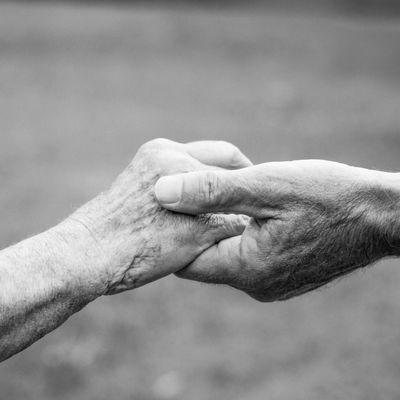
On Wednesday morning, former NFL quarterback Doug Flutie’s father, Dick, died of a heart attack. Less than one hour later, his mother, Joan, also died — also of a heart attack. In a post written later that day on Facebook, Flutie said, “They say you can die of a broken heart and I believe it.”
The Fluties had been married for 56 years, and the story of their death is one you hear from time to time: longtime couples who are as inseparable in death as they were in life, with one dying shortly after the other. Perhaps the most famous example is that of Johnny and June Cash, who died within just four months of each other. But there’s also Bernard and Irene Jordan, an elderly English couple who died within a week of each other in January, or Ruth and Harold Knapke, who were married for 65 years and whose deaths were just 11 hours apart in 2013. And just a few months ago, Jeanette and Alexander Toczko — married for 75 years — died within 24 hours of each other in their home. Alexander passed away first, in Jeanette’s arms.
It’s known as the widowhood effect, considered by social scientists to be “one of the best documented examples of the effect of social relations on health,” as Nicholas A. Christakis of Harvard and Felix Elwert of the University of Wisconsin–Madison wrote in 2008, in what is perhaps the best existing study on the subject. Previously, as Christakis and Elwert note in their paper, research suggested that within the three months after one spouse dies, the chance that the other will follow is anywhere from 30 to 90 percent.
For their study, they went big — it’s the largest and most comprehensive research project to date on the phenomenon. Christakis and Elwert analyzed nine years’ worth of data collected from nearly 373,189 elderly married couples in the U.S., specifically looking at when each half of the pair died, and why. Their findings showed an 18 percent increase in “all-cause mortality” for men whose wives died first; for women, the risk is 16 percent. “The death of a spouse, for whatever reason, is a significant threat to health and poses a substantial risk of death by whatever cause,” they conclude.
The question, then, is why. In cases like the Fluties’, the quick death immediately following bereavement may be caused by the intense physical ramifications of grief. “The No. 1 cause of death of a bereaved spouse is heart disease and sudden death, meaning the heart stops,” reported NBCNews.com, quoting internist Dr. Lee Lipsenthal. (Lipsenthal has since passed away himself.) It’s been called “broken heart syndrome,” the colloquial term for takotsubo cardiomyopathy. “The condition nearly always follows a traumatic emotional loss, such as death of a spouse, parent or child and it primarily affects women,” wrote NBCNews.com reporter Linda Dahlstrom, referencing Cleveland Clinic geriatric specialist Dr. Barbara Messinger-Rapport. “It causes chest pain and sudden heart failure, believed to be brought on by a surge of fight or flight hormones.”
And this also helps explain why the widowhood effect isn’t as commonly seen among people whose spouses died of diseases such as Alzheimer’s or Parkinson’s. Christakis and Elwart’s study found no increased chance of death in these cases, and only a very slight increased risk in spouses of those who died of certain cancers. In these cases, the grieving spouse had time to prepare for the death, something called anticipatory grief. The sadness of the loss is just as great, but the shock isn’t so severe.
But there are other, quieter causes, too. Christakis and Elwert found an especially sharp increase in the risk of death from “acute health events” — that is, accidents or emergencies, like infections or bone fractures. Similarly, the risk of death from chronic disease — like diabetes or COPD — was also particularly high. In its way, this is just as wrenching as the thought of those who die of literal broken hearts, because it suggests that bereaved spouses’ new and unfamiliar solitude may make them more vulnerable to accidents or lapses in treatment for chronic conditions. After a lifetime together, it’s often unthinkable to adjust to being alone.




